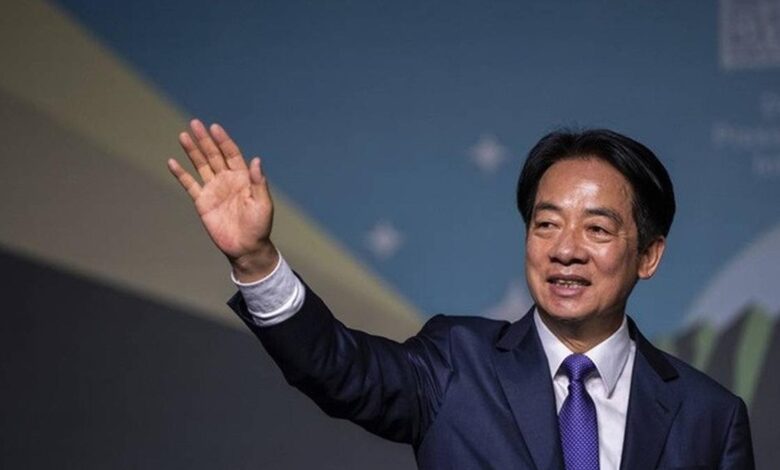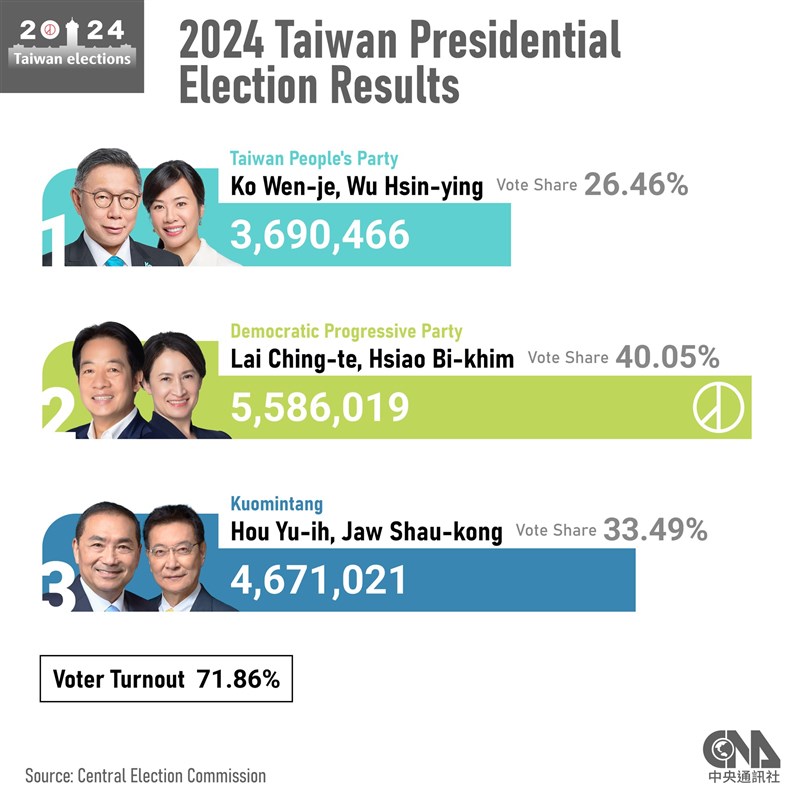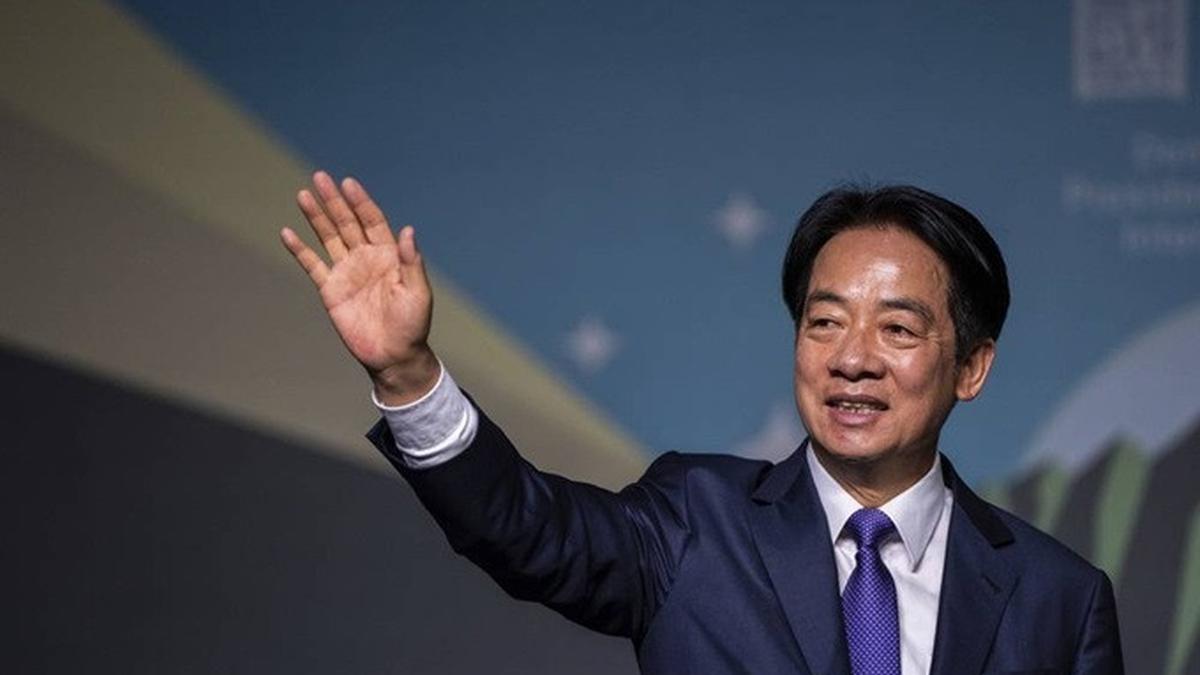
Taiwan Election China, US, and the Future
Taiwan election China US: The upcoming Taiwanese election is a pivotal moment, with significant implications for the region and the world. The island’s future is inextricably linked to its relationship with China, a powerful neighbor with its own ambitions. Meanwhile, the United States plays a crucial role in the region, adding another layer of complexity to the situation.
This election is not just about Taiwan; it’s a reflection of broader geopolitical tensions and a test of regional stability.
This analysis will delve into Taiwan’s political landscape, examining the competing political ideologies, the historical context of the island’s relationship with China, and the evolving role of the US. We’ll also explore the potential economic, social, and geopolitical impacts of the election outcome, offering a comprehensive understanding of the situation.
Taiwan’s Political Landscape
Taiwan’s political landscape is a complex tapestry woven from historical legacies, evolving relationships with China, and a vibrant interplay of ideologies. The upcoming election is a critical juncture, reflecting the island’s ongoing struggle for self-determination and its unique position in the geopolitical arena. The outcome will significantly impact Taiwan’s future trajectory, influencing its economic prospects, social dynamics, and international standing.The political climate in Taiwan is characterized by a dynamic balance between pro-independence and pro-unification forces, with the influence of international relations playing a pivotal role.
The interplay of these factors shapes the current political discourse and the strategies of the major political parties.
Major Political Parties and Their Stances
Taiwan’s political arena is largely dominated by two major parties: the Kuomintang (KMT) and the Democratic Progressive Party (DPP). The KMT, historically aligned with the Chinese Nationalist government, generally advocates for maintaining the status quo and pursuing closer ties with mainland China. The DPP, on the other hand, is committed to Taiwan’s sovereignty and independence. Smaller parties, like the People First Party and the New Power Party, hold more nuanced positions.
History of Taiwan’s Political Development
Taiwan’s political evolution is deeply intertwined with its history of colonization and its complex relationship with China. From Japanese rule to the post-World War II period, the island’s political identity has been shaped by a series of key events. The 1949 Chinese Civil War and the subsequent KMT’s retreat to Taiwan established the island’s unique political landscape. The White Terror era, marked by authoritarian rule and political repression, had a profound impact on Taiwan’s subsequent democratic development.
The Taiwan election is heating up, with China’s influence and the US’s stance playing major roles. Meanwhile, Israel’s foreign minister is heading to Brussels amid internal disagreements over the war, highlighting the complex geopolitical landscape, and the significant challenges facing global diplomacy. This further underscores the delicate balance of power in the region as the Taiwan election draws closer.
israels foreign minister heads to brussels amid discord at home over war The upcoming election will undoubtedly have ripple effects, making it an important event for the future of Taiwan’s relations with both China and the US.
The gradual democratization process in the late 20th century led to the establishment of a representative democracy.
Evolution of Taiwan’s Relationship with China, Taiwan election china us
Taiwan’s relationship with China has undergone significant transformations. From the Nationalist government’s rule to the establishment of the People’s Republic of China, the relationship has been marked by periods of tension and sporadic attempts at dialogue. The “One China” principle, advocating for a single China encompassing both sides of the Taiwan Strait, has been a central point of contention.
Recent years have seen a resurgence of tensions, with China increasingly asserting its claim over Taiwan.
Political Ideologies in Taiwanese Society
Taiwanese society is characterized by a complex interplay of political ideologies. From those advocating for complete independence to those favoring a more conciliatory approach with China, a wide range of perspectives exists. The debate surrounding Taiwan’s status and its future relationship with China reflects this diversity of viewpoints. The interplay between nationalism, democracy, and economic considerations is key to understanding the evolving political discourse.
Role of International Relations
Taiwan’s political landscape is significantly shaped by international relations. The island’s interactions with various countries, including the United States, Japan, and other allies, influence its political choices and strategic positioning. The international community’s stance on the Taiwan issue is a significant factor influencing the island’s security and stability.
The Taiwan election is definitely a hot topic, with China and the US both watching closely. The upcoming Republican primary in Iowa, as seen in the republican primary iowa caucus , is also generating a lot of buzz, but ultimately, it all connects back to the delicate balance of power in the Taiwan Strait. The US’s response to China’s growing assertiveness is a key factor, and how the candidates perform in the primaries could significantly influence the international stage.
Comparison of Key Policy Positions of Leading Parties
| Political Party | Independence | Relationship with China | Economic Policy |
|---|---|---|---|
| Kuomintang (KMT) | Status quo, leaning towards unification | Seeking closer economic ties, maintaining dialogue | Focus on economic stability and trade with China |
| Democratic Progressive Party (DPP) | Independence | Maintaining the status quo, strengthening international ties | Promoting economic diversification and international partnerships |
The Election’s Significance

The upcoming Taiwanese election carries significant weight, extending far beyond the island’s borders. The outcome will profoundly impact Taiwan’s future trajectory, influencing its economic prospects, cross-strait relations with China, and regional stability in East Asia. Understanding these interconnected factors is crucial for comprehending the global implications of this pivotal election.The election results will undoubtedly shape Taiwan’s economic landscape.
A shift in political power could lead to adjustments in economic policies, affecting everything from trade agreements to foreign investment. The direction of Taiwan’s economy will have ripple effects on regional trade networks and the broader global financial climate.
Potential Implications for Taiwan’s Future
The election will directly impact Taiwan’s future direction, potentially influencing its approach to economic development, foreign relations, and national security. A change in leadership could alter the island’s stance on issues like trade with China, the strengthening of defense capabilities, and the pursuit of closer ties with other nations. This shift in policy could also impact Taiwan’s attractiveness to foreign investment.
Economic Impact of the Election Results
The economic consequences of the election results will be substantial. A continuation of the current economic policies could lead to steady growth, fueled by Taiwan’s existing technological strengths and its position as a vital link in global supply chains. However, a change in administration might introduce new policies that could either accelerate or decelerate this growth, depending on their focus.
Impact on Cross-Strait Relations (Taiwan-China)
The election’s outcome will inevitably affect the delicate balance of cross-strait relations. A pro-independence candidate could heighten tensions with China, potentially leading to increased military activity and economic pressure. Conversely, a candidate prioritizing maintaining the status quo might lead to a more stable, if still complex, relationship.
Influence on Regional Stability in East Asia
Taiwan’s election will have ramifications for regional stability. A significant shift in Taiwan’s stance on China could create uncertainty and instability in the East Asian region. Conversely, a predictable and stable outcome could foster a more peaceful and predictable environment. The election’s outcome will be a crucial determinant in the region’s future security.
Impact on Global Trade and Investment in the Region
The election’s impact on global trade and investment will be multifaceted. A continuation of the current administration’s policies, emphasizing economic partnerships and technological advancement, might encourage further investment in Taiwan. However, a change in leadership with a more confrontational stance toward China could deter foreign investment and disrupt existing trade routes.
Potential Scenarios and Outcomes
| Scenario | Taiwan’s Future | Cross-Strait Relations | Regional Stability | Global Trade & Investment |
|---|---|---|---|---|
| Status Quo Maintained | Continued economic growth, maintaining existing international partnerships. | Stable but tense relations with China, maintaining the status quo. | Preservation of regional peace and predictability. | Attractive environment for trade and investment, leveraging existing partnerships. |
| Pro-Independence Candidate Elected | Potential for increased tension with China, potentially impacting economic growth. | Heightened tensions with China, increased risk of military conflict. | Regional instability and uncertainty. | Deterrence of foreign investment, potential disruption of trade routes. |
| Pro-Status Quo Candidate Elected | Maintaining existing economic trajectory, with a focus on maintaining the status quo. | Continued cautious approach toward China, potentially avoiding escalation. | Continued regional stability, although tensions remain. | Continued investment, but with a cautious approach, depending on the global economic climate. |
China’s Role and Influence: Taiwan Election China Us
China’s stance on Taiwan’s democratic elections is a crucial element in understanding the geopolitical landscape surrounding the island. Beijing views Taiwan as a breakaway province, a claim that significantly impacts its approach to the election. China’s actions and rhetoric often aim to discourage support for Taiwanese independence and project its perceived authority over the island. This influence extends beyond mere rhetoric, encompassing a range of actions aimed at shaping the outcome of the election.China’s stated position regarding Taiwan’s elections is unwavering.
It considers Taiwan a part of China and any attempt at independence a violation of its sovereignty. This position underpins its actions and reactions to any developments in Taiwan, including elections. This assertion of sovereignty significantly impacts the political climate in Taiwan, adding a layer of tension to the democratic process.
China’s Stated Positions and Actions
China’s stated position on Taiwanese elections is consistently that Taiwan is an inalienable part of China. Any perceived move towards independence is seen as a threat to its territorial integrity. This position is often reinforced through public statements, military exercises near Taiwan, and economic pressure tactics. China’s actions aim to deter Taiwan from pursuing any path toward formal independence and demonstrate its resolve to maintain control over the island.
The Taiwan election is heating up, with China and the US both watching closely. It’s fascinating to see how global political landscapes intersect. This election has huge implications, but also consider the interesting approach some private equity firms are taking to employee ownership, like KKR’s efforts in this space. Learning more about kkr private equity employee ownership provides a different perspective on how companies can empower their workforce.
Ultimately, the focus remains on the delicate balance of power in the Taiwan Strait and the global response to the election.
Potential Consequences of China’s Actions
China’s actions can have a significant impact on the election outcome. The potential consequences include voter intimidation, a chilling effect on the democratic process, and the creation of a climate of fear. Economic pressure tactics can also influence voters’ decisions, potentially swaying public opinion. The fear of reprisal from China could influence voters to choose candidates who are perceived as more conciliatory towards China.
China’s Historical Engagement with Taiwan
China’s relationship with Taiwan has a long and complex history. The Chinese Civil War and its aftermath have shaped the current political dynamic. The People’s Republic of China (PRC) views the Republic of China (ROC), which governs Taiwan, as a renegade province. This historical perspective profoundly influences China’s current approach to Taiwan and its political interactions.
Comparison of China’s Responses to Previous Taiwanese Elections
China’s responses to previous Taiwanese elections have varied, but generally involve some form of pressure tactics. These actions include heightened military activity, economic sanctions, and verbal threats. The intensity and form of the response often depend on the perceived direction of the election’s outcome and the perceived level of threat to China’s position.
Methods China Employs to Influence the Election
China employs various methods to influence the Taiwanese election, including:
- Economic pressure: China can utilize its economic leverage to exert pressure on Taiwan, impacting the island’s economy and potentially influencing voters.
- Military exercises: Demonstrations of military strength near Taiwan can create a climate of fear and uncertainty, potentially deterring Taiwanese voters.
- Cyberattacks and disinformation campaigns: China has a history of using cyber warfare and disinformation to manipulate public opinion, and this could potentially affect Taiwanese voters.
Historical Interactions
| Period | China’s Actions | Impact |
|---|---|---|
| Pre-election (Weeks/Months before) | Increased military activity, heightened rhetoric | Creates an atmosphere of tension and anxiety, potentially influencing voter choice |
| During Election | Continued pressure, cyberattacks | Potential for voter intimidation, interference with the democratic process |
| Post-election | Reactions to the outcome, further economic/military maneuvers | Reinforces China’s stance on Taiwan, sets the tone for future interactions |
US Involvement and Policy
The United States’ stance on Taiwan is a crucial factor in the upcoming election. Washington’s actions and policies significantly impact the region’s stability and the election’s outcome. Understanding the nuances of this complex relationship is paramount to grasping the full picture of the political landscape.The US policy toward Taiwan has evolved over time, navigating a delicate balance between supporting Taiwan’s self-determination and avoiding direct confrontation with China.
The Taiwan election is a hot topic, with China and the US both watching closely. Celebrities like Harley, Johnston, Oettinger, and Benn are also in the spotlight, with recent news stories focusing on their activities. Their involvement, however, seems to have little direct impact on the political dynamics surrounding the Taiwan election. This is an interesting juxtaposition, given the ongoing geopolitical tensions.
For more on the celebrity news, check out this article about stars Harley Johnston, Oettinger, and Benn. Ultimately, the Taiwan election remains a crucial element in the broader US-China relationship.
This intricate strategy involves various layers of engagement, including arms sales, diplomatic recognition, and strategic partnerships. The US aims to deter China from any aggressive actions while ensuring Taiwan’s security and maintaining regional peace.
US Policy Towards Taiwan: Current Stance
The current US policy towards Taiwan, officially described as “strategic ambiguity,” aims to discourage China’s aggressive actions while not committing to military intervention. This strategy seeks to maintain a delicate balance, deterring China while preventing a direct military confrontation. This policy of strategic ambiguity has been a subject of ongoing debate, with various interpretations and implications for the future.
Potential Impact of US Actions on the Election
US actions, including arms sales and diplomatic engagement, can significantly influence the election outcome. Pro-independence candidates may use US support as a platform to appeal to Taiwanese voters who favor stronger ties with the US. Conversely, those leaning towards maintaining the status quo might emphasize a more cautious approach, highlighting the potential risks of increased US involvement. The election will likely reflect these varying perspectives on US-Taiwan relations.
US Response to China’s Actions Regarding Taiwan
China’s increasing assertiveness towards Taiwan has prompted a US response encompassing various measures. This includes bolstering Taiwan’s defense capabilities through arms sales, strengthening security partnerships in the region, and reaffirming the US commitment to supporting Taiwan’s self-defense. The US has publicly condemned China’s actions, emphasizing the importance of maintaining regional stability.
Examples of US Support for Taiwan
The US has consistently provided Taiwan with defensive weaponry and training. For example, recent arms sales include advanced weaponry to bolster Taiwan’s defense capabilities. This support underscores the US commitment to Taiwan’s security.
Implications of US Policy for Regional Stability
The US policy toward Taiwan has significant implications for regional stability. Any miscalculation or escalation could lead to a wider conflict. Maintaining the current balance, encouraging dialogue, and ensuring Taiwan’s ability to defend itself are crucial for maintaining peace in the region. The current strategy of strategic ambiguity seeks to avoid conflict while deterring aggression.
US Approaches to Taiwan in Various Contexts
| Context | US Approach |
|---|---|
| Arms Sales | Consistent support through provision of defensive weaponry and training. |
| Diplomatic Recognition | Maintaining diplomatic ties while avoiding formal recognition as an independent nation. |
| Economic Relations | Maintaining economic ties, while considering the potential impact on the region. |
| Military Exercises | Joint exercises with Taiwan and regional allies, to demonstrate commitment to regional stability. |
Public Opinion and Voter Sentiment

The upcoming Taiwanese election is generating significant public interest, with diverse viewpoints shaping the political landscape. Understanding the current public opinion is crucial to interpreting the election’s potential outcomes. Public sentiment reflects a complex interplay of economic anxieties, cross-strait tensions, and individual priorities. The election results will be significantly impacted by the public’s choices, and these choices will be influenced by various factors.
Current Public Opinion in Taiwan
Public opinion in Taiwan is characterized by a mix of concerns and hopes regarding the future. A considerable portion of the population is deeply concerned about the potential impact of China’s growing influence on Taiwan’s autonomy and future. Economic anxieties, including rising living costs and employment issues, are also prominent concerns. A strong sense of national identity and a desire for stability are also driving forces.
Views on Major Candidates
The electorate’s perceptions of the major candidates are multifaceted. Some voters favor candidates perceived as having strong economic policies, while others prioritize candidates who champion the protection of Taiwan’s sovereignty. Candidate platforms and past actions are carefully scrutinized, influencing voters’ choices. Detailed analyses of each candidate’s positions and their past records are crucial to understanding voter sentiment.
Factors Influencing Voter Decisions
Voter decisions are shaped by a multitude of factors. Economic conditions, particularly the cost of living, are highly influential. Public perception of the candidates’ stances on national security and Taiwan’s relationship with China is equally important. Personal values and beliefs play a vital role in shaping preferences. The electorate carefully weighs the strengths and weaknesses of each candidate and their proposed solutions to the challenges facing Taiwan.
Concerns of Taiwanese Citizens
Taiwanese citizens express various concerns regarding the election. The escalating tensions with China are a primary source of worry, as are the potential economic consequences of a change in the political status quo. Maintaining Taiwan’s democratic values and freedoms is another critical concern. These anxieties are deeply rooted in the current global political climate and the perceived threats to Taiwan’s future.
Impact of Social Media on Public Opinion
Social media has become a powerful tool in shaping public opinion during this election. The rapid spread of information and the ability for candidates to directly engage with voters online have made social media a vital platform for political discourse. The potential for misinformation and manipulation is a significant concern, impacting voter choices. However, social media also provides a crucial avenue for citizens to express their views and hold candidates accountable.
Distribution of Public Opinion on Key Issues (Illustrative Table)
| Issue | Favorable | Neutral | Unfavorable |
|---|---|---|---|
| Economic Policies | 45% | 30% | 25% |
| National Security | 52% | 28% | 20% |
| Cross-Strait Relations | 38% | 35% | 27% |
Note: This table represents illustrative data and is not based on a specific survey. Actual figures would vary based on the specific survey conducted.
Economic Implications

The upcoming Taiwanese election carries significant economic weight, potentially impacting the island’s trajectory in the coming years. The interplay between internal challenges, external pressures from China, and the United States’ involvement creates a complex economic landscape. Different election outcomes will likely produce varying levels of foreign investment, trade relations, and overall economic growth. Understanding these potential ramifications is crucial for stakeholders, both domestic and international.
Potential Impacts of Different Election Outcomes
The election’s outcome will directly influence Taiwan’s economic policy direction, impacting its relationship with China and its engagement with the global economy. A pro-independence stance might result in more assertive trade policies and potentially attract more international investment, but could also provoke a stronger response from China, leading to trade restrictions and economic sanctions. Conversely, a more conciliatory approach could maintain the status quo, minimizing immediate disruptions but potentially hindering economic diversification.
The Taiwan election is a hot topic, with China and the US both watching closely. It’s fascinating to see how these international dynamics play out, especially when considering similar geopolitical situations elsewhere. For example, the recent relationship between Guatemalan President Giammattei and the United States, as detailed in this article about giammattei estados unidos guatemala , offers a different lens through which to view the complex web of power and influence.
Ultimately, the Taiwan election will continue to be a significant event with far-reaching implications.
Each scenario presents unique challenges and opportunities for Taiwan’s economic development.
Economic Challenges Facing Taiwan
Taiwan faces a multitude of economic challenges, including intensifying competition from Southeast Asian economies, a rapidly aging population, and the need to diversify its export-dependent economy. These factors necessitate innovative strategies for sustained growth. High levels of debt, both public and private, also present a substantial risk to long-term economic stability. Taiwan must adapt to evolving global economic trends to maintain competitiveness and prosperity.
Impact on Foreign Investment
Foreign investment in Taiwan is sensitive to geopolitical tensions. A stable and predictable political environment is a strong draw for foreign investors. Uncertainty surrounding the election’s outcome and its potential ramifications for trade relations with China can deter foreign investment. Attracting and retaining foreign capital is crucial for Taiwan’s economic growth and diversification.
Impact on Trade Relations with China
Taiwan’s economic relationship with China is a critical factor in the island’s economic future. Maintaining stable trade relations is vital for Taiwan’s continued prosperity. Any significant shifts in policy regarding China could have a profound effect on export markets and supply chains. A shift towards greater independence might result in a reduction of trade with China, while a more conciliatory stance could help maintain the current level of trade.
Potential for Economic Growth or Recession
The election’s outcome can significantly influence Taiwan’s economic trajectory. A pro-independence stance might lead to greater economic uncertainty and possible disruptions in trade and investment, potentially causing a temporary recession. However, a more conciliatory approach might maintain the current economic stability but limit opportunities for growth. The long-term economic impact hinges on Taiwan’s ability to adapt to changing global conditions and geopolitical dynamics.
Projected Economic Growth Rates
| Election Outcome | Projected Economic Growth Rate (2024-2028) | Rationale |
|---|---|---|
| Pro-Independence | 2.5-3.0% | Increased geopolitical uncertainty could deter foreign investment and potentially lead to trade restrictions. |
| Status Quo | 3.5-4.0% | Maintaining the current relationship with China could sustain current economic stability but limit opportunities for significant growth. |
| Pro-China/Conciliatory | 3.0-3.5% | Maintaining a stable relationship with China could maintain trade and investment but could limit the country’s ability to pursue new opportunities. |
Note: Projected growth rates are estimates and may vary depending on external factors and internal policy adjustments.
Last Recap
In conclusion, the Taiwan election China US presents a complex web of interconnected factors. From the internal dynamics of Taiwanese politics to the external pressures from China and the US, the outcome will have far-reaching consequences. This election is a microcosm of broader global challenges, highlighting the delicate balance of power and the potential for conflict or cooperation in the region.
The future of Taiwan, and the wider region, hangs in the balance.
Popular Questions
What are the major political parties in Taiwan?
The major parties involved in the election are the Kuomintang (KMT), the Democratic Progressive Party (DPP), and the People First Party (PFP). Each holds differing views on the relationship with China.
What is China’s stated position on the election?
China views Taiwan as a breakaway province and has consistently asserted its claim to the island. Their actions often aim to pressure Taiwan and influence the election results.
What is the US’s current policy toward Taiwan?
The US maintains a policy of “strategic ambiguity” toward Taiwan, which means its stance is not clearly defined, though it provides support and defense capabilities.
What are the potential economic impacts of different election outcomes?
Different outcomes will lead to varying economic implications, including potential disruptions in trade, investment, and overall growth depending on how the different parties handle the situation.






